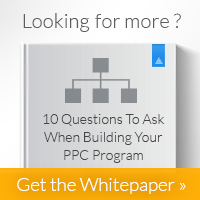Once goals have been defined, budgeting and measurement plans have been established, and its been decided what strategies and tactics are going to be implemented, the next question is who will manage the PPC program?
There are 3 ways to manage PPC programs:
- In-House Management
- Employ an Agency
- Combination of In-House and Agency (Hybrid approach)

Let’s now take a look at each approach and examine the benefits and downsides of each method.
What are the pros and cons of an in-house management team?
‘In House’ means dedicating internal resources to oversee strategy and manage the day-to-day operations.
The benefits of in-house management are:
- Intimate Business Knowledge: Those who work directly for an organization have the best understanding of how the business operates. In-house employees best understand the ‘why’ behind the things that are being done and how these things can affect the paid search program.
- Sense of Ownership: Employees of a company usually have a more vested interest in the outcome of things. Their sole focus is the success of their organization.
So what are the downsides?
- Untrained PPC Professionals: More than likely, you will have to train people on PPC that don’t do this type of work for a living. They might be marketers, but not fluent in the ins and outs of PPC. There will be a learning curve and possibly expense tied to getting your team up to speed.
- Limited Learning Opportunities: In-house employees will often not be surrounded by other paid search professionals. In-house employees are limited to the people they work with. Of course reading blogs or watching ‘how to’ videos are helpful. This does not replace being surrounded by a team of PPC professionals with a vast array of experience.
- Expense: If an organization decides to build an internal team, this means adding headcount and the associated financial burdens that accompany it.
Read more in the full white paper: 10 Questions to Ask When Building Your PPC Program
What are the pros and cons of employing an agency?
Another option is to hire an agency. There are ‘full service’ agencies that offer complete digital marketing solutions, including paid search. There’s also agencies whose sole purpose is to manage paid search accounts.
The benefits of hiring an agency are:
- Collective Knowledge: Staff is immersed in the best practices of pay-per-click advertising and is usually fully certified in search, display, and analytics. Agencies are also able to dedicate more time and resources to an account. The ability of an agency to always put fresh eyes on an account is something that can’t be done with limited in-house staff.
- Cost: In many instances, hiring an agency is cheaper than increasing headcount within an organization. Agencies often charge a percentage of advertising spend or a flat monthly fee.
- Access to Additional Resources: Agencies tend to build strong relationships with the large advertising platforms. Agencies can consult their Google or Bing teams for advice on how to handle key aspects of an account. Agencies often gain access to insights that are simply not shared directly with advertisers.
So what are the downsides of hiring an agency?
- Emotional Connection: Agencies have large rosters of clients and account managers are routinely reassigned from one account to another. This means there’s a chance account managers will not have the same emotional connection to your account as someone who works directly for your organization.
- Communication: There will be a lot more work needed on the client’s part to communicate their needs and wants. There will also be a learning curve while the agency gets up to speed on the ins and outs of your paid search account. Be prepared to put in this work and never assume an agency understands completely what’s expected of them.
- Understanding of Your Business: Agencies will not have the intimate knowledge of your business model. They are working without access to proprietary data unless the organization provides access to it and trains them how to interpret the data. This is something that in-house managers do not have to worry about.
What are the pros and cons of the hybrid approach?
Another option is to keep your PPC program in-house but employ an agency on a retainer basis. This arrangement can usually be done on a project-by-project basis or contracting for a specific amount of hours per month.
What are the advantages of this hybrid approach?
- Extra Help on Special Projects: The hybrid approach offers the advantage of keeping full control while providing ability to bringing in an agency as ‘extra resources’ for special projects. These services can be ‘as needed’ as opposed to ongoing management.
- Strategic Consultation: Sometimes you need an ‘extra set of eyes’ or a different perspective on things. Bringing in an agency to perform an audit or provide strategic recommendations can help bring new and fresh insights.
What is a disadvantage of the hybrid approach?
- Cooperation Between Teams: Ideally, it is expected that the in-house and agency teams will work in harmony. However, the in-house team might feel threatened by an agency and not cooperate to their fullest. Systems must be put in place for one side to not feel threatened by the other side’s presence and that everyone is working together to achieve common goals
Conclusion
Each PPC management program presents its own set of benefits and difficulties. It’s important that companies understand which solution will work best for them and choose a PPC management style accordingly.




